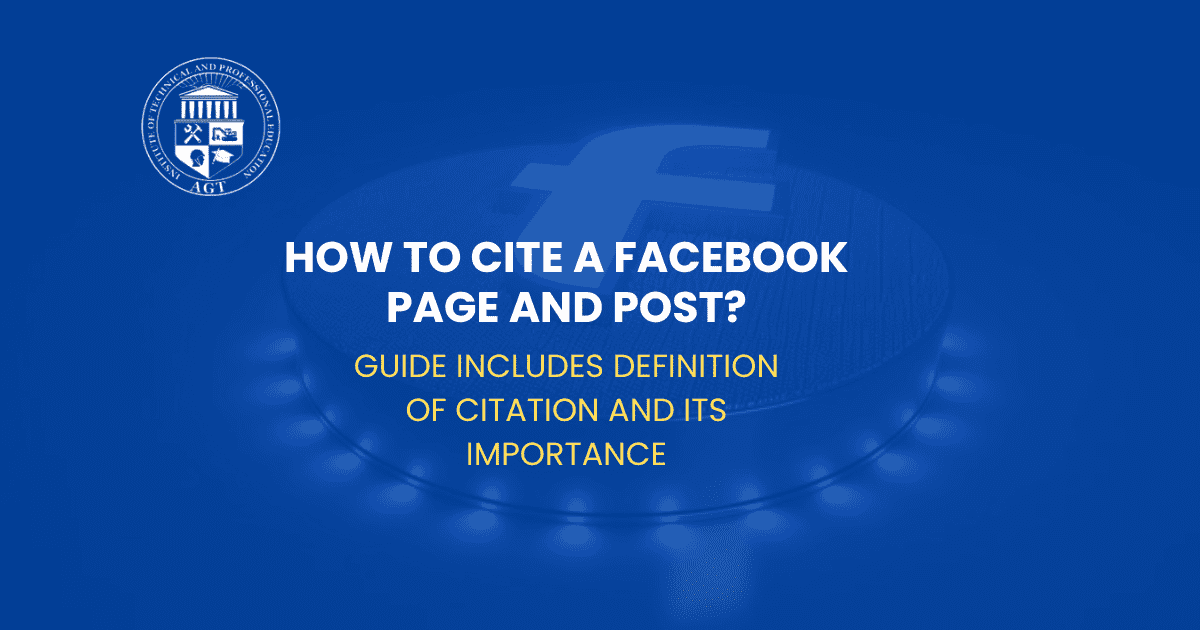Define Citation |Its Importance | How to Cite a Facebook Page and Post?
Table of Contents
What is Citation?
A citation is a reference to the source of information used in your research. Any time you directly quote, paraphrase, or summarize the important elements of someone else’s idea in your work, an in-text citation should be followed. You do not have to cite your ideas unless they have been published.
Guiding the specifics of social media citations can be complex, especially with the constant updates in citation styles. This guide will explore how to cite a Facebook page and post according to the latest 7th edition of the APA style, providing your references are as delicate and compliant as possible.
ALSO READ THIS: What are Meta pixels and Meta Datasets?
What is the Importance of Citing Social Media?
Before discussing the specifics, it’s important to understand why correctly citing Facebook and other social media sources matters. Social Media Accurate citations help maintain the credibility of your writing and provide readers with a pathway to the source for further exploration. Citations serve several important purposes in academic and professional writing.
1. Credibility
By citing sources, writers loan credibility to their work by showing that reputable sources support their arguments and claims. Citation helps readers trust the information presented.
2. Acknowledgement
Citations acknowledge the intellectual contributions of others. They recognize the ideas, research, and creative works that have influenced the writer’s thinking and helped shape their work.
3. Avoiding Plagiarism
Plagiarism, the act of presenting someone else’s work or ideas as your own, is a serious academic offense. Citations provide a way for writers to give credit to the original authors and creators, thereby avoiding plagiarism.

4. Transparency
Citations allow readers to trace the origins of information and ideas presented in a piece of writing. They provide transparency and enable readers to verify the accuracy of the information and explore further if desired.
5. Building on Existing Knowledge
By citing previous research and scholarship, writers contribute to the ongoing conversation within their field of study. Citations provide a foundation upon which new knowledge and insights can be built.
6. Legal and Ethical Obligations
In some cases, citing sources may be a legal or ethical requirement, particularly when using copyrighted materials or when writing about sensitive topics.

How to Cite a Facebook Page?
Citing a Facebook page involves a slightly different approach:
| Format | Page Name. (n.d.). Title of the page [Facebook page]. Retrieved Date, from URL. |
| Example | Awesome Pets Community. (n.d.). Welcome to our Community [Facebook page]. Retrieved April 20, 2024, from https://www.facebook.com/awesomepetscommunity/ |
| Use of “n.d.” | Use “n.d.” for no specific date and italicize the page title, indicating it is a living document that may change. |
RECOMMENDED: Why Does My Facebook Keep Jumping Around?
How to Cite a Facebook Post?
To cite a Facebook post in APA 7th edition:
| Format | Author Last Name, First Initial. (Year, Month Day). The first 20 words of the post [Type of post]. Facebook. URL. |
| Example | Johnson, M. (2023, September 12). Exploring the mysteries of black holes and beyond. Join us for an exciting journey through the cosmos! [Video attached] [Live stream]. Facebook. https://www.facebook.com/johnson.spaceexplorer/videos/1234567890/ |
| Attach images | Remember to include any media types in square brackets (e.g., [Image attached]) and describe the post type accurately. |
RECOMMENDED: How to Add Products in Facebook Catalogs?
Special Considerations
- If citing a temporary post like a Facebook Story or a live stream that isn’t archived, treat it as a personal communication that isn’t included in the reference list but can be mentioned in the text.
- Always count URLs, hashtags, and emojis as one word each in the citation.
Final Thoughts
With the rise of digital content, learning how to cite a Facebook page and post correctly becomes increasingly essential. By following these guidelines, you can ensure your citations are both accurate and valuable, providing your readers with reliable sources and improving the overall credibility of your academic or professional work.
RECOMMENDED: What are FB Catalogs and How do I Make Facebook Catalogs For My Product?
Call to Action
Whether you are a student, educator, or professional, keeping up-to-date with citation practices is key to effective communication in our digital world. Bookmark this guide for easy access whenever you need to reference a Facebook source!
FAQs (Frequently Asked Questions)
How to Cite a Facebook Page APA 7th Edition?
For a Facebook page, include the page title or description, the year (or “n.d.” for no date), and the URL. If citing a specific post, add the author’s name, publication date, and the post content. Adjust the format according to APA guidelines.
What Information do I Need to Include in a Citation?
A citation typically includes details such as the author’s name, the title of the work, the publication date, and information about where the source can be found (such as a journal name, book title, or URL). The specific format and style of the citation may vary depending on the citation style guide you are following, such as APA, MLA, or Chicago.
Why Use Citations and References?
You should cite a source whenever you use someone else’s ideas, words, data, or images in your own work. This includes direct quotations, paraphrases, summaries, and even ideas that are closely inspired by someone else’s work. Failing to properly cite sources can lead to accusations of plagiarism.







